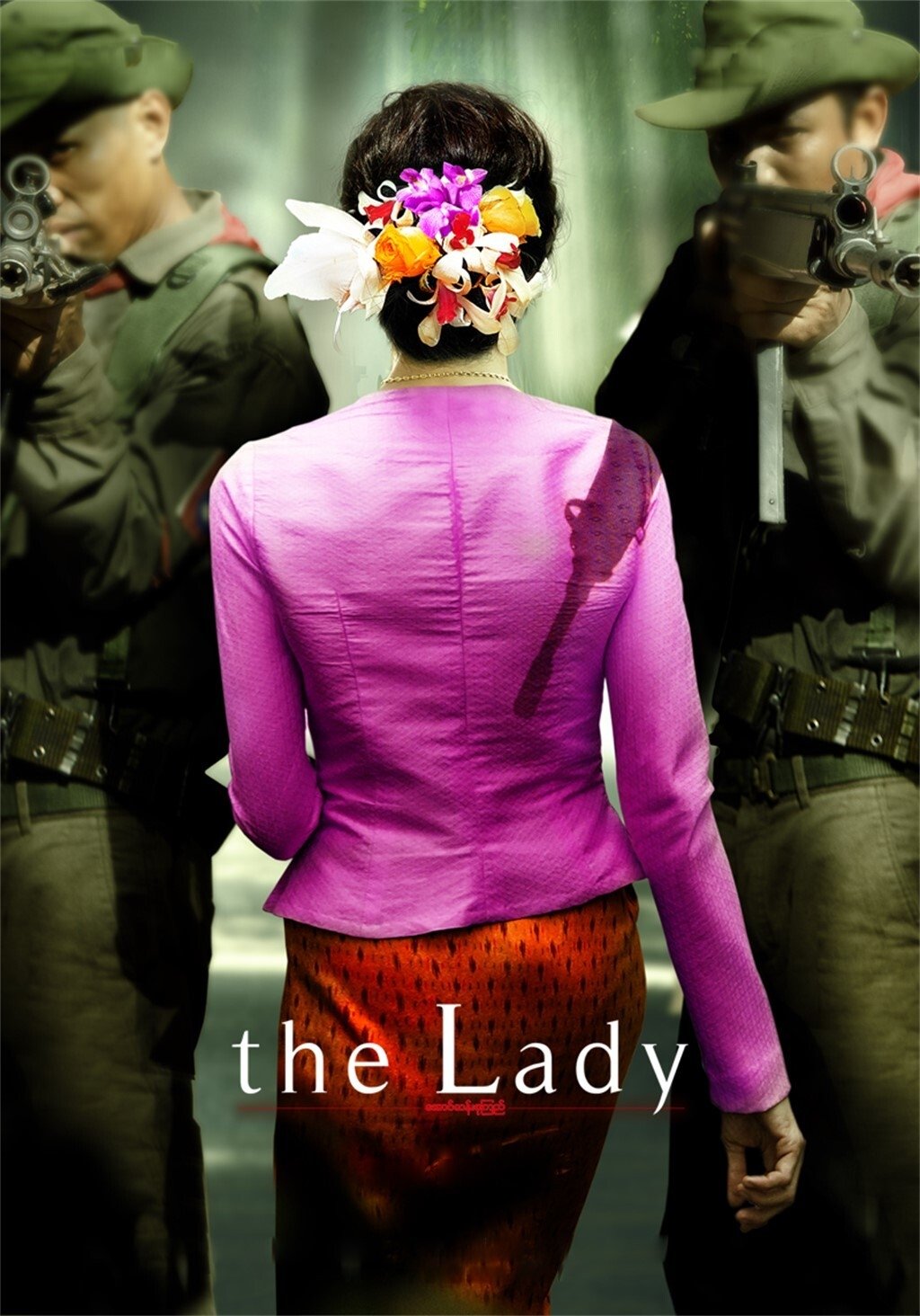Director:
Luc Besson
Producer: Virginie Besson-Silla, Andy Harries
Screenplay: Rebecca Frayn
Starring:
Michelle Yeoh as Aung San Suu Kyi
David Thewlis as Michael Aris
Jonathan Raggett as Kim Aris
Jonathan Woodhouse as Alexander Aris
Susan Wooldridge as Lucinda Philips
Benedict Wong as Karma Phuntsho
Donatienne Dupont as Ma Ma
Music: Éric Serra
Cinematography: Thierry Arbogast
Editing: Julien Rey
Release Date: September 12, 2011 (Toronto), November 30, 2011 (France)
Running Time: 132 minutes
Language: English, Burmese
Producer: Virginie Besson-Silla, Andy Harries
Screenplay: Rebecca Frayn
Starring:
Michelle Yeoh as Aung San Suu Kyi
David Thewlis as Michael Aris
Jonathan Raggett as Kim Aris
Jonathan Woodhouse as Alexander Aris
Susan Wooldridge as Lucinda Philips
Benedict Wong as Karma Phuntsho
Donatienne Dupont as Ma Ma
Music: Éric Serra
Cinematography: Thierry Arbogast
Editing: Julien Rey
Release Date: September 12, 2011 (Toronto), November 30, 2011 (France)
Running Time: 132 minutes
Language: English, Burmese

***SPOILER ALERT***
The Lady: A Return to Form for Luc Besson
And the Lady comes to save it all. Thank you! After watching Arthur and Adèle Blanc-"Seca", my faith in Luc Besson is restored with this movie. Though Besson himself regrets making it, due to the later revelations about Aung San Suu Kyi, "The Lady" stands as a testament to his skill in crafting compelling narratives. It’s a stark reminder of why filmmakers should tread carefully with ongoing political stories. There's an underlying naivety and political idealism that permeates the film, but it remains well-written and engaging. The film, however, does get repetitive with its back-and-forth travels and constant goodbyes—though I’m exaggerating, it feels silly after the 30th hug. The relationship between Aung San Suu Kyi and Dr. Michael Aris is the heart of this drama, with Burma’s struggle for democracy as the backdrop. Towards the end, I found myself emotionally invested in their family’s plight, maybe because I’m going through a similar separation. My pregnant wife and six-year-old child are in Russia until September while I stay here in Portugal trying to keep things afloat.
Stellar Performance by Michelle Yeoh
Michelle Yeoh’s dedication to her role as Aung San Suu Kyi is evident. She learned Burmese and brought an incredible depth to her character. Interestingly, she was deported from Myanmar in June 2011 after meeting Aung San Suu Kyi, deemed a "persona non grata" due to her role in the film. One standout scene is the retelling of how Suu Kyi peacefully faced down the military — a beautifully captured moment that left a significant impact. After this scene, there's a montage of people discussing the event, which I found very well done. It added a sense of realism to the story. A minor character that I've enjoyed watching was that mean soldier who shot a doctor and kept an eye on Suu Kyi during her house arrest. He convincingly portrayed a brainless, obedient soldier. The hopeful ending of the film contrasted sharply with the real-world events that followed, leaving a bitter taste considering the Rohingya genocide denial by Suu Kyi and the loss of Burma's democracy in 2021. Speaking of which, who could forget the viral video of the girl doing aerobics in front of the military coup unfolding behind her? Remember? Democracy is sold to us as the hero of politics when in fact it's just a bunch of bullshit and San Suu Kyi is just one more politician that proves that. The people never have any real representation. Power is always for grab, and the masses always to be exploited. Bleak, I know. I'm a solarpunk tech-anarchist who believes that only AI has the power to liberate us, common people.
Music and Moustache
Eric Serra’s soundtrack blends traditional Burmese instruments with orchestral arrangements, complementing the film’s emotional beats. One song particularly stands out during the scene where Suu Kyi receives a heartbreaking letter from her husband. I also don't mind Palchebel's Canon. However, one distracting element was the younger kid’s moustache — an attempt to make him look older that just came off as silly. It's the kind of nitpicking you get here: while the movie covers a country's political and social struggle, what bothers me is a silly moustache. Despite my minor gripes, I can say this film is worth watching. It's well-written, beautifully shot, and provides a glimpse into a critical piece of world history. For instance, I learned that Burma officially changed its name to Myanmar in 1989 as part of an effort to shed colonial remnants. "Myanmar" is the more formal and inclusive name, while "Burma" is seen as colloquial. Now I know.
🎥 Cinematography (8/10):
Beautifully shot with excellent use of settings and scenes that capture both the emotional and historical essence of the story.
📖 Story (7/10):
Engaging narrative that balances the personal and political aspects of Aung San Suu Kyi's life, though it occasionally feels repetitive with some unnecessary scenes.
🎬 Direction (8/10):
Luc Besson delivers a strong directorial effort, successfully bringing a complex and emotional story to life, despite the political naivety.
👥 Characters (8/10):
Everyone is interesting, from the superstitious dictators to the main characters.
💥 Visual Effects (6/10):
The film doesn’t rely heavily on visual effects, but the practical effects and set pieces are well-executed and effective.
🎭 Acting (8/10):
Michelle Yeoh delivers a standout performance as Aung San Suu Kyi, with strong support from David Thewlis and others, despite minor casting quirks: the kids were kind of strange.
💬 Dialogue (7/10):
The dialogue is emotionally resonant, particularly in the scenes between Aung San Suu Kyi and her family.
🌍 Setting/Atmosphere (7/10):
The film's portrayal of Burma is immersive, but sometimes English is spoken when Burmese should be, and that's a little annoying.
🎵 Music (8/10):
Éric Serra’s soundtrack blends traditional Burmese instruments with orchestral arrangements effectively.
😄 Entertainment Value (7/10):
Despite its flaws and political naivety, the film is engaging and emotionally impactful. However, it can feel a bit long at times.
Our blog is currently being updated regularly!



Comments
Post a Comment